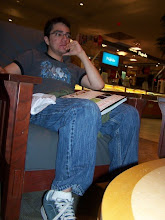 "Is your name really Ely?
"Is your name really Ely? No.
You don't want to say your name.
I don't want to say it.
Why?
I couldnt trust you with it. To do something with it. I dont want anyone talking about me. To say where I was or what I said when I was there...I think in times like these the less said the better. If something had happened and we were survivors and we met on the road then we'd have something to talk about. But we're not. So we dont."
Names are important in Cormac McCarthy's The Road, in that no character is ever named. The protagonists are simply referred to as the man and the boy. Maybe their names are hidden from us because we cannot be trusted with them, but I think it is more likely that they are hidden because they represent the old life, the old universe, which is long gone by the first page of The Road.
McCarthy's novel is about a man and his son making their way to the coast in a post-apocalyptic world covered in ash. They push a shopping cart filled with supplies that always runs out, until they are "lucky" and stumble upon more food. But finding more food is more of a curse than a blessing because it means they have to carry on, they have to keep trying rather than just laying down and dying in the road. They have to face starvation, thieves, and cannibals.
I started to read this book while waiting to get my haircut at a place in the mall. I read the first 20 pages while I waited, and I had to learn how to get around McCarthy's long sentences and his almost reluctant use of punctuation. Without commas in a long sentence, it is hard to know where to take a breath between ideas. Conversations, as seen above, are not surrounded in quotation marks and characters are not identified every line. Nor is it really emphasized how each piece of dialog is said. But I was still able to get the emotion because of the poetic way McCarthy writes his novel. And I realized, when reattempting the first few paragraphs, that each sentence had to be read like the lines of a stanza: rhythmically, emphasizing each word like in poetry. Sentence length became irrelevant.
Religious imagery abounds through the book. The man calls his son the word of God and an angel. He also says there is no God and they are his prophets. McCarthy calls them old gods. There is a conversation between the boy and the man where they discuss crows (all animals are long gone), and as the boy imagines that crows could fly to the sun, it is like a primitive culture developing mythology. Another part the man thinks about sitting in the ashes, cursing God, and dying, a reference to Job. But God is another relic in this book, part of a long gone world. The man realizes when talking to his son that he is an alien to the child, from another planet.
There is a link between this book and A Canticle for Leibowetz another post-apocalyptic tale. Canticle ends with the world suffering another nuclear war, and only the sharks, those primitive creatures who endured past extinctions, survive in the depths of the oceans. In The Road, the man thinks that in the depths of the ocean squids may still be alive.
The Road is covered with beautifully depressing images. A favorite quote of mine happens early in the book: "By day the banished sun circles the earth like a grieving mother with a lamp." What makes this book unique, what makes it more than just a tale of a depressing future after an unknown force has destroyed all life, a future where soon the last tree will fall, where plants and animals are long gone, where ashes rain down like snow, what gives this book life is the tale of the man and his son. Simple moments like where the man has the boy put his cold feet against his father's chest to get warm assures us that love prevails. But whether prevailing love is a blessing or a curse, much like finding more food on the road, that is unknown.
Says the old man, the one the man and his son encounter on the road, the one who calls himself Ely:
"When we're all gone at last then there'll be nobody here but death and his days will be numbered too. He'll be out in the road there with nothing to do and nobody to do it to. He'll say: Where did everybody go? And that's how it will be. What's wrong with that?"
*I saw the film for The Road before reading the book. In terms of adaptation, I think the film gets the feeling of the book right, even though it merges some events and jumps around. The theme of father and son in a barren wasteland and the issue of whether to end their lives is still there in the movie.*
